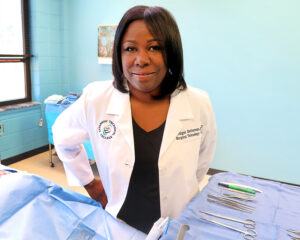Betterson selected as Surgical Tech Dept. Head
 SAVANNAH, Ga. – Savannah Technical College recently selected Bridget Betterson as department head for Surgical Technology. She will develop, manage and teach classes, develop and coordinate curriculum, conduct assessments, evaluate effectiveness of courses through student data, graduate surveys and employer surveys, and ensure compliance with surgical technology accreditation standards of regional and national accrediting agencies.
SAVANNAH, Ga. – Savannah Technical College recently selected Bridget Betterson as department head for Surgical Technology. She will develop, manage and teach classes, develop and coordinate curriculum, conduct assessments, evaluate effectiveness of courses through student data, graduate surveys and employer surveys, and ensure compliance with surgical technology accreditation standards of regional and national accrediting agencies.
Betterson has more than 19 years of experience as a certified surgical technologist with the National Board of Surgical Technology and Surgical Assisting. She has been a full-time Surgical Technology instructor for the College since 2018. While employed at Memorial Health University, she had the opportunity to work in many surgical specialties to include General, ENT, Plastics, Orthopedics, and Neurology.
A Savannah native, she is a graduate of Herschel V. Jenkins High School and a STC Surgical Technology graduate. She is a member of the Association of Surgical Technologists.
STC’s Surgical Technology Associate Degree program requires a competitive admissions process. It is taught at STC’s Savannah campus. Surgical technologists work under the supervision and delegatory authority of a surgeon to facilitate the safe and effective conduct of invasive and non-invasive surgical procedures, ensuring that the operating room environment is safe, that equipment functions properly, and that the operative procedure is conducted under conditions that maximize patient safety. Graduates test to be certified with successful completion of the national Certified Surgical Technologist (CST) examination to be awarded national certification as a surgical technologist. In AY2020, program graduates had an in-field placement (employment) rate of 93.3%. For more information visit savannahtech.edu/SurgicalTech.
###
#2218 | November 17, 2021
Media Contact: Amy Shaffer, APR
912.443.5512 or ashaffer@savannahtech.edu
Savannah Technical College serves Coastal Georgia with quality, market-driven technical education with campus locations in Chatham, Effingham and Liberty Counties. Serving more than 10,000 credit and non-credit students annually, Savannah Tech offers nearly 150 different instructional programs in Aviation Technology, Business and Professional Services, Industrial Technology, and Health Sciences in addition to Adult Education classes, industry-specific training and continuing education. The College serves as an economic and community development partner for the region, offering corporate and customized training and assessment programs for business and industry.
Savannah Technical College is accredited by the Southern Association of Colleges and Schools Commission on Colleges (SACSCOC) to award associate degrees, diplomas and technical certificates of credit. Questions about the accreditation of Savannah Technical College may be directed in writing to the Southern Association of Colleges and Schools Commission on Colleges at 1866 Southern Lane, Decatur, GA 30033-4097, by calling (404) 679-4500, or by using information available on SACSCOC’s website (www.sacscoc.org).
